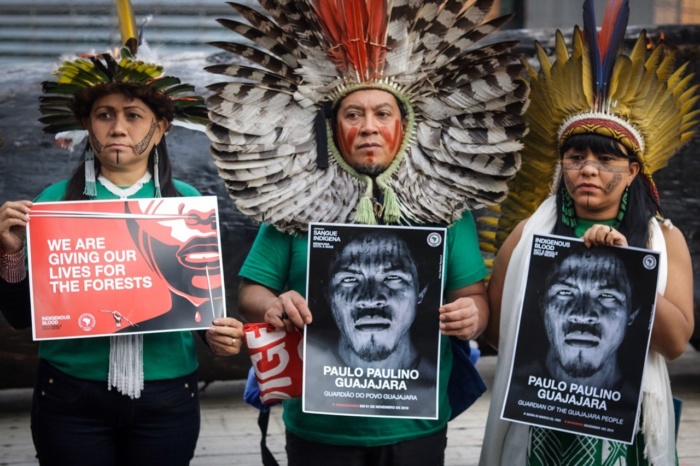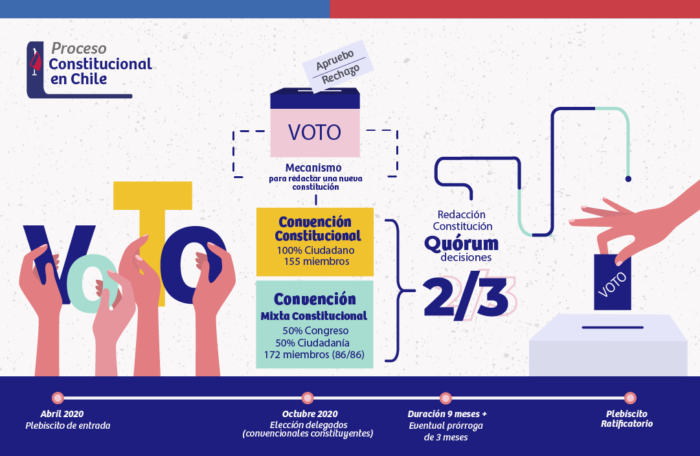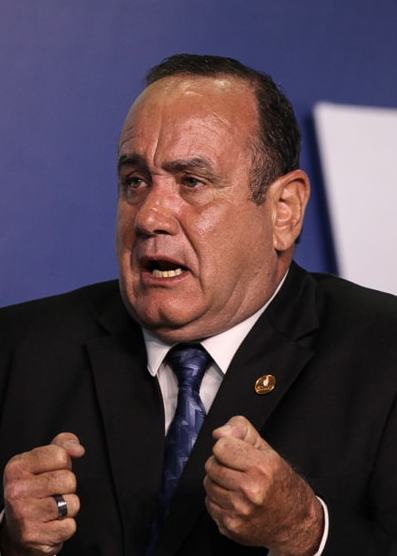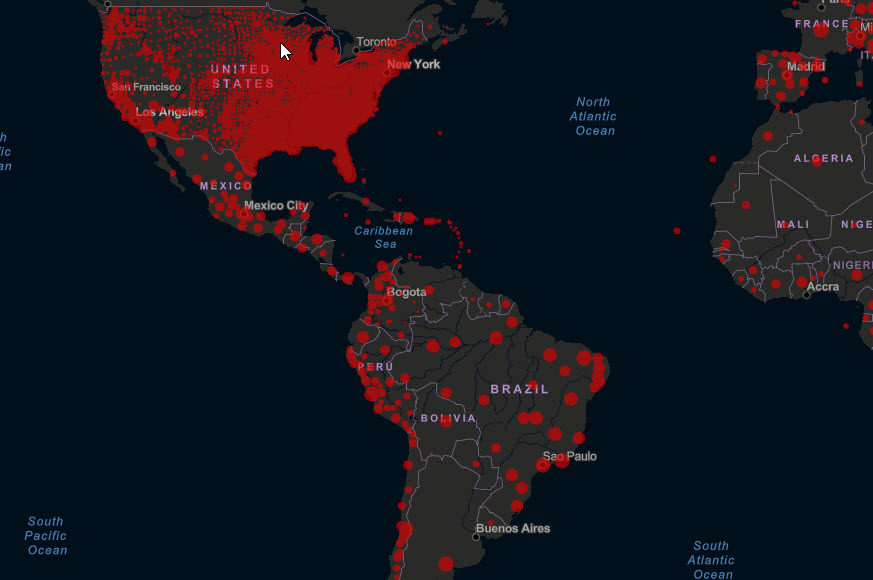- By Emily Gregg, edited by Mike Gatehouse.
- LAB publishes this series of overviews of the spread of coronavirus across the region and the reaction of governments, politicians and local communities. With our limited resources we could not hope to provide a truly comprehensive survey.
- Figures for infections and mortality, summarised in the table at the end, are those given by the World Health Organisation Situation Dashboard on Thursday 22 October, and John Hopkins University Coronavirus Centre, as of 4pm (GMT), 22 October. Where figures appear in the images within the article, they may refer to earlier dates. We are unable to provide figures on excess deaths due to the lack of data for most countries in the region.
- LAB will attempt to follow up this story, focusing on the poor, marginal communities, indigenous groups and inequalities in treatment and economic compensation for the effects of this terrible pandemic on individuals and families.
- See LAB articles at the head of our Home Page and in the Covid-19 section for further news, testimony & information. See also the posts on our Facebook page.
- We plan soon to add a Covid-19 virtual chapter to our Voices of Latin America website which will include interviews with and testimony from those in the front-line of the battle against the pandemic.
Argentina
As Argentina reached 800,000 cases of coronavirus – the eighth highest number in the world at the time – it also became the country with the highest rate of tests with positive results. Some 60 per cent of the Coronavirus tests carried out each day give a positive result. A source from the Ministry of Health explained that the number was due to the Detactar programme, which tests the contacts of people confirmed to have the virus.
The number of cases in Argentina surpassed one million on 20 October.
If you find this article useful, please consider donating to LAB. At present LAB is run entirely by volunteers. If we had more resources, we could do so much more. You can donatehere– we are a registered charity. If you can make a regular or monthly donation, that will help us to plan and extend our work.
On 12 October, demonstrators in Argentina protested against the government’s handling of the pandemic, amongst other issues including corruption and the justice system. While cases have spiked after lockdown, restrictions have eased, some of the protestors complained that the lockdown has damaged Argentina’s already struggling economy.
Brazil
The states of Bahía and Parana agreed to test Russia’s ‘Sputnik’ vaccine against coronavirus. Bahía announced plans to buy fifty million doses of the virus in September as part of ‘phase III’ of the testing process. As of 6 October, however, there had still been no formal request for the trials to start. Brazil’s health regulator, Anvisa, noted that the delay was due to the promising results of the vaccines produced by Oxford University and AstraZenenca Plc, and by Sinovac Biotech Ltd.
Brazil’s health minister, Eduardo Pazuello, announced on 20 October that the federal government and São Paulo state have agreed to buy 46 million doses of the China’s vaccine against Covid-19, Coronavac. However, the following day Brazilian President Jair Bolsonaro announced on twitter, ‘We will not buy the Chinese vaccine’ since it has not finished the required trials. He further said, ‘The Brazilian people will not be anyone’s guinea pig.’
Brazil’s armed forces completed testing Guajajara people, an indigenous community from Maranhão, for Coronavirus. The mission was in response to criticism that the state was not doing enough to protect indigenous peoples. A Guajajara spokesperson, Ythai Guajajara, praised the efforts of the doctors and nurses who carried out 37,000 tests and checked for other illnesses and thanked them for their administration of medicine, food, and protective equipment. However, SESAI (the Government’s service for indigenous health) received criticism for not protecting the community against the virus.
A total of 447 indigenous people in Brazil are confirmed to have died from Covid-19 out of a population 800,000, while another 388 have disappeared from reserves in urban areas.

A study by the Brazilian think tank Fundação Getulio Vargas (FGV) has warned that 15 million Brazilians will fall into extreme poverty if support payments from the Government are stopped. The emergency payments initially provided 600 reales a month to those who earn less than the minimum wage of 515 reales (US$92) a month. The payment was halved at the beginning of September and is due to end completely at the end of the year.
Right-wing president Bolsonaro is keen to extend the programme due to the popularity it has given him. However, the bill to extend it is currently stalled in congress and faces steep opposition within the government amongst fears of an uncontrolled budget deficit. To continue the programme would require breaking constitutional spending limits. The payments have so far cost some US$57,600 million.
Chile
As Chile prepares for a long-awaited referendum for a new constitution, set to take place on 25 October, the head of Chile’s electoral service, Patricio Santamaría, has reassured voters that to vote is ‘no more dangerous than going to the supermarket’. He added, ‘What is at play is too important for our citizens to be deducted.’
The vote will take place in person. Voters will have to socially distance, provide their own pen, and remove their mask only briefly to prove their identity. Over-60s will have dedicated times to attend and an additional 15,000 ‘facilitators’ will ensure Covid-19 procedures are being followed.

Investigation continues into ex-Minister for Health, Jaime Mañalich’s handling of the pandemic. He is accused of serious infringement of the constitution and the law, of having put the life and health of the population at risk and of manipulating the figures of Covid-19 infections and deaths. Mañalich had resigned in June after increasing evidence of the final charge. The Ministry was presenting to the population case figures as much as 30,000 lower than those it was declaring to the World Health Organisation.
Andrea Albagli, until recently a civil servant in the Ministry of Health, gave testimony on 30 September and handed over her emails which confirm the deliberate falsification of the figures. Johanna Acevedo, the head of the ministry’s planning division, also supports the accusation.
The health ministry, currently led by Enrique Paris, has denied the PDI (Chile’s investigative police) access to the ministry’s computers, which contain emails exchanged between Mañalich and civil servants, as well as figures for the purchase of mechanical ventilators.
You will find many more articles on the Covid-19 crisis on our website. Go to our Home Page to see the latest, or for a full list, go to the News page. You can also keep up-to-date by subscribing to our (free) monthly e-mail newsletter.
Colombia
Restrictions that enforced alternate working days for various sectors were lifted in Colombia’s capital, Bogotá, on 21 September. The various sectors will now have varying start times to prevent congestion on public transport. Bars and nightclubs remain closed, and large events are still prohibited.
A report by the Colombia’s Ombusdman office has highlighted an increase in violence against the LGBTQ community during the pandemic. Some 63 people who identified as part of the community were killed in the first eight months of 2020. A total of 388 cases of violence were reported in the same period, compared to 309 in all of 2019.
The office also cited more obstacles in accessing justice due to the pandemic as well as a lack of empathy and sensitivity for victims when reporting attacks. Thirty-six cases of aggression are reported to have been committed by members of the National Police. The office has asked the government for targeted actions to prevent violence and structural discrimination.
A quarter of primary and secondary schools as well as 154 universities are preparing to return to classes in Colombia. Some schools and universities had carried out classes online since physical classrooms were shut at the end of March. Students in parts of the country without internet connection have received their classes through radio, television, or printed guidebooks.
Cuba
Six months after it closed its borders, Cuba has reopened 13 of its 15 provinces to tourists. Havana, which only left strict lockdown on 1 October, remains closed to tourists. The country has managed to keep cases low and successfully controlled a second wave by isolating people with suspected cases and their contacts at the cost of the state. Tourism generates some US $2-2.5 billion a year for the island, whose economy has taken a heavy hit due to the costs of isolating citizens, the absence of tourists, and increased US economic sanctions.
Guatemala

Guatemala’s President Alejandro Giammattei has recovered from Coronavirus. The president, who had been diagnosed with multiple sclerosis in his youth, announced he was showing symptoms on 18 September, and later underwent treatment for anaemia. Giammattei made his first public appearance since falling ill on 5 October.
Venezuela
President Nicolás Maduro has proposed administering Russia’s anti-Covid Sputnik vaccine to the 14,400 candidates in the next election. In an announcement made on state television, he suggested that it would allow the candidates of 107 parties to carry out their campaigns ‘with greater tranquillity and comfort’. The vaccine has been criticised as having only a 10 per cent success rate.
Venezuelans are again leaving their homes for Colombia. In the face of food shortages, unaffordable living costs due to dollarization, and the worst economic crisis in history, they feel they have to leave to survive.
At least 100,000 Venezuelans returned to Venezuela during the pandemic after losing work. However, they have reported being stigmatised by the government and facing accusations of spreading the virus. In a report published on 13 October, Human Rights Watch reported the abuses committed against returning migrants by authorities, including being detained in quarantine centres with limited access to food and water. Those now leaving Venezuela have cited beatings and extorsion by the National Guard and the Police.
Residents along the route have come to the aid of fleeing migrants, offering food, advice about the best routes to take, and solidarity. In San Cristóbal, a group of neighbours gathered and sang the national anthem when troops detained migrants. The migrants were ultimately allowed to pass.
Colombia’s borders are officially closed until at least 1 November. However, Colombia’s office of migration said that migrants have been entering through informal crossings for around a month. Director General of Migration Colombia, Juan Espinosa, believes that the number of Venezuelans in Colombia could reach two million within five months, compared to 1.73 million at the end of June.
Country by country summary. Case and death figures from WHO Situation Dashboard and John Hopkins University Coronavirus Centre as of 3pm (GMT), 22 October 2020.
Reports from some individual governments and unofficial sources suggest considerably higher figures.
| Country | WHO Situation Report 185 | John Hopkins University | ||
|---|---|---|---|---|
| Cases | Deaths | Cases | Deaths | |
| Argentina | 1,021,397 | 27,175 | 1,037,325 | 27,519 |
| Belize | 2,886 | 45 | 2,937 | 46 |
| Bolivia | 140,037 | 8,526 | 140,228 | 8,558 |
| Brazil | 5,273,954 | 154,837 | 5,298,772 | 155,403 |
| Chile | 495,637 | 13,719 | 495,637 | 13,719 |
| Colombia | 974,134 | 29,272 | 981,700 | 29,464 |
| Costa Rica | 97,922 | 1,222 | 99,425 | 1,236 |
| Cuba | 6,368 | 127 | 6,368 | 127 |
| Dominican Republic | 122,398 | 2,206 | 122,398 | 2,206 |
| Ecuador | 154,115 | 12,404 | 155,625 | 12,453 |
| El Salvador | 32,120 | 933 | 32,262 | 936 |
| Guatemala | 102,415 | 3,567 | 102,415 | 3,567 |
| Haiti | 8,979 | 231 | 8,979 | 231 |
| Honduras | 90,232 | 2,582 | 91,078 | 2,596 |
| Mexico | 860,714 | 86,893 | 867,559 | 87,415 |
| Nicaragua | 4,362 | 155 | 5,434 | 155 |
| Panama | 125,739 | 2,585 | 126,435 | 2,597 |
| Paraguay | 56,073 | 1,231 | 56,819 | 1,250 |
| Peru | 874,118 | 33,875 | 874,118 | 33,875 |
| Puerto Rico | 58,830 | 774 | data unavailable | data unavailable |
| Venezuela | 87,644 | 747 | 88,035 | 753 |
Emily Gregg is a LAB correspondent and author. She lived in Arica, Chile, until returning to the UK because of the pandemic. She also wrote The Student Revolution chapter in LAB’s book Voices of Latin America (2019).

